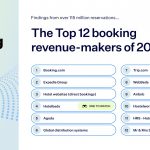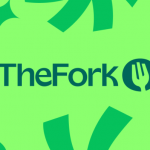Today, more than ever, revenue management is the key to running a profitable and successful hotel.
NB: This is an article from Lybra, one of our Expert Partners
The data that is now readily available, as well as ways to analyse and track it, gives you a host of new opportunities to turn a profit at your business. The most successful savvy operators and hoteliers constantly look for new ways to improve the way they run their operation, allowing them to gain an edge over the competition.
Subscribe to our weekly newsletter and stay up to date
This is where revenue management comes in as it allows hoteliers to anticipate room demand while optimising their pricing and availability to maximise profits. We’ll dive into exactly what hotel revenue management is, why it’s important today, and what KPIs hoteliers can use to improve their business.
Defining Hotel Revenue Management
Revenue management is the strategic use of local market data, performance data, competitor rates, and other analytics that help you predict customer demand for your rooms. In turn, this allows you to optimise distribution and pricing in a way that helps maximise your hotel’s revenue and profit.
The main goal of this process is to boost your revenue growth by being able to successfully sell your perishable inventory at your hotel to the correct guests and at the right time. Beverage and food offerings, as well as other amenities, will come into play but your hotel rooms are the biggest component.
Why You Should Focus More On Revenue Management Today
There are several reasons why you should focus more on revenue management for your hotel. For starters, there are increasingly higher uncertainty levels throughout the hospitality market. This uncertainty can make people second-guess booking a hotel stay, even during peak times of the year. Hotel revenue management can help you find niche customers and sell rooms.
The demand is also much more specific, and competition is far tougher, as you’re all competing for these very specific customer groups. So being able to see the trends allows you to protect against rostering too many staff for slow periods while ensuring you have enough staff for busy times.
It can also help get you on the correct distribution channels to get your hotel out in front of your customers and beat your competition. The right combination of marketing channels can be a powerful tool to get your hotel out front and centre for your area for customers you can’t directly contact. Also, by using a large dataset and smart technology, you can predict market demand and react to market changes to adopt new strategies and systems to keep high performance levels.
Four Main KPIs That Revenue Managers Should Improve
So what are the main KPIs your revenue managers should look at and monitor? Understanding what they are and what they mean is key to successfully using them to improve your hotel’s revenue. Below we wrote a very short description of the top 4 KPIs every hotel manager or owner must fully understand:
• ADR. The average daily rate is a metric that measures the average rental revenue of your hotel years per occupied room per day. You use this metric to figure out your hotel’s operating performance.
• Booking lead time. This refers to the calendar days between when a person books a room to the actual arrival date. You use this KPI to measure and determine rate plans, like advance purchase rates.
• Occupancy rate. Occupancy rate is the percentage of occupied rooms in your hotel at any given point. It’s a high-level success indicator, and you get it by dividing the total number of rooms occupied by how many rooms you have available. Take this answer and times it by 100 to get a percentage rate.
• RevPAR. This metric stands for revenue per available room. In short, it’s the metric you use to assess your hotel’s ability to fill your available rooms while charging an average rate.
Tools Hotel Revenue Managers Should Use
Improving the above mentioned KPIs in the current very competitive and volatile hospitality idustry scenario is a tough job requiring bid data analysis from a multitude of sources, deep knowledge of your hotel’s industry segment and buyer personas and last but not least the right data analysis tools allowing you to predict demand, monitor the competition, be aware of the market’s demand-offer dynamics at any time and adjust rates dynamically according to all these parameters.
One of the most important tools hotel revenue managers should use to improve these key metrics is a Revenue Management System or RMS.
An RMS is a software suite that mines and analyses huge amounts of data in order to help revenue managers make smart decisions regarding pricing or even create automated pricing strategies aiming to increase hotel revenue.
Lybra Assistant RMS is a Revenue Management System using intelligent algorithms that pull data from many sources and making possible very accurate hotel pricing based on demand forecasting and big data analytics.
The post Why Hotel Revenue Management Is Extremely Important Today appeared first on Revenue Hub.































